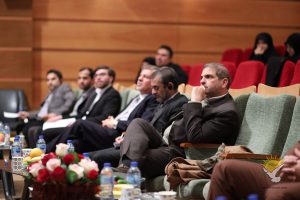According to the public relations of Foundation of Dialogue and Solidarity of United Nations, on Tuesday, December 10, 2019, the Conference of “The Future of Peace and Human Rights in the West Asia” held with suggestion and help of Foundation of Dialogue and Solidarity of United Nations, hosted by Imam Khomeini International University of Qazvin.
This conference, which commemorated the International Day of Human Rights that was along with Student Day, held in Arabic language which was attended by a large crowd of Arab Students from Arab countries and those students concerning about peace. At the beginning of the conference, UN Secretary General Antonio Guterres’ message was presented on the occasion of World Human Rights Day, in Which he called for the support of young people working for human rights worldwide. the message also mentioned the following: every individual has to enjoy all aspects of human rights, regardless of where they live, regardless of race, ethnicity or religion. Following the meeting, Dr. Saad Javad Qandil, the Iraq ambassador in Iran, who was present as a special guest, gave a few minutes to present his views and opinions on the problems and challenges of maintaining peace in the West Asian region and gave his suggestions for friendship between two countries.
At the beginning he reminded the great civilization of Mesopotamia and the countries that are located in this region, he said: this region is full of riches and natural resources and this has caused the greed and for this reason caused the presence and deployment of world powers in the region and it poses a challenge to peace. Recalling the history of the occupation of Palestine territories and the mood of occupation of the Zionist regime with the idea of dominating the Promised Land, he cited the Zionist’s regime’s behavior as another cause of instability and destroying peace in the region and added: “the Arab-Islamic dispute with Israel has been going on for more than seventy years, but now we see that Israel is seeking to divert the thoughts and feelings of the Arab states in such a way that it has imposed itself on Islamic dialogue and intends to make Iran a real enemy in the region.” Dr. Qandil described ethnic and religious extremism as another threat to peace in the region, which sometimes emerged as groups such as al-Qaeda and ISIS, and posing dangers to regional countries. He described the issue of water and limited water resources as a threat to world peace and stability, referring to the law of Hammurabi (the sixth king of ancient Babylon), who said Iraq had legislated the first law on water more than three thousand years ago that it is essential that today, countries around the world are taking this issue and the important challenge of the future seriously. He further noted the good political, economic and pilgrimage relations between the two countries between Iran and Iraq, and Iran’s cooperation in the elimination of ISIS, the high level of economic exchanges up to $ 20 billion and the unparalleled annual travel of ten million pilgrims between the two countries are reasons for good and solid relations between the two countries. He also praised the Hormuz peace plan which put forward by the Iranian president, and emphasized the need for a common path to stabilize and achieve lasting peace.
Following the conference, Dr. Mojtaba Ferdowsi Pour, the former Iranian ambassador in Jordan and one of the speakers at the conference, endorsed and repeated the ambassador’s remarks on the region’s richness of natural resources and the greed of world powers, as well as the problem and challenge of limiting water resources, refers to the terrorism in the region that threatening the peace and security in west Asia and he found it essential to confront it. He knows talks between the countries of the Persian Gulf region based on their many commonalities is a way that certainly leads to unity and he considered Iran’s Hormuz peace plan one of the same things to pay attention to these commonalities.
At the end of the conference, the Foundation of Dialogue and Solidarity of United Nations’ statement was read and heard by the participants.
